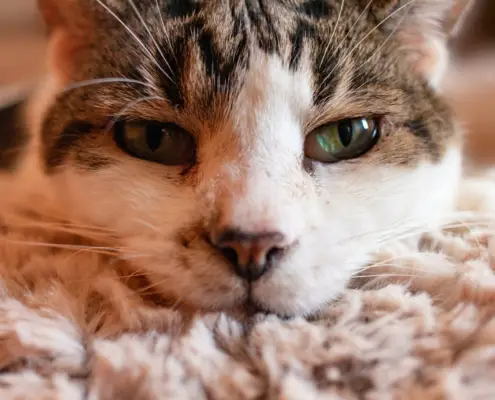
Fungal infections can be a serious health concern for cats, causing discomfort and potentially leading to more severe complications if left untreated. Fungi are microscopic organisms that can thrive in various environments, including the skin, hair, and nails of cats. In this article, we will explore the different types of fungal infections that can affect cats, their symptoms, causes, and risk factors. Additionally, we will discuss effective preventive measures and treatment options to keep your feline friend safe and healthy.
Common Types of Fungal Infections in Cats
There are several common types of fungal infections that can affect cats. One such infection is ringworm, which is caused by the fungus Microsporum canis. Ringworm presents as circular patches of hair loss, often with a red or scaly appearance. Another common fungal infection is cryptococcosis, caused by the yeast-like fungus Cryptococcus neoformans. This infection typically affects the respiratory system and can lead to symptoms such as sneezing, nasal discharge, and difficulty breathing.
Blastomycosis is another fungal infection that can affect cats, caused by the fungus Blastomyces dermatitidis. It primarily affects the respiratory system but can also spread to other organs. Histoplasmosis, caused by the fungus Histoplasma capsulatum, is another fungal infection that commonly affects cats. It usually affects the respiratory system and can cause symptoms such as coughing, difficulty breathing, and weight loss. By being aware of these common fungal infections, cat owners can be vigilant and take necessary precautions to prevent their feline friends from contracting these diseases.
Symptoms and Signs of Fungal Infections in Cats
Identifying the symptoms and signs of fungal infections in cats is crucial for early detection and prompt treatment. The symptoms can vary depending on the type of fungal infection and the affected area. In the case of ringworm, cats may exhibit circular patches of hair loss with redness and scaling. The affected areas may appear inflamed and itchy, leading to excessive scratching or grooming.
For fungal respiratory infections such as cryptococcosis, cats may present with sneezing, nasal discharge, and difficulty breathing. In more severe cases, neurological symptoms such as head tilt, seizures, and loss of coordination may occur. Blastomycosis and histoplasmosis can also cause respiratory symptoms, as well as additional signs such as weight loss, loss of appetite, and lethargy. It is important to observe any changes in your cat’s behavior or physical appearance and seek veterinary attention if you notice any concerning symptoms.
Causes and Risk Factors of Fungal Infections in Cats
Fungal infections in cats can be caused by various species of fungi that are present in the environment. Cats can contract these infections through direct contact with infected animals, contaminated soil, or exposure to fungal spores in the environment. Ringworm, for example, is highly contagious and can be transmitted through contact with infected animals or objects.
Certain factors can increase a cat’s susceptibility to fungal infections. Kittens, elderly cats, and those with compromised immune systems are more vulnerable to fungal infections. Additionally, cats living in crowded or unsanitary conditions, or those with poor nutrition, are at a higher risk. Understanding these causes and risk factors can help cat owners take appropriate preventive measures to protect their feline friends from fungal infections.
Preventing Fungal Infections in Cats
Prevention is key when it comes to fungal infections in cats. There are several measures that cat owners can take to minimize the risk of their feline friends contracting these infections. Regular grooming and inspection of your cat’s coat can help detect any early signs of fungal infections, such as patches of hair loss or skin abnormalities. Keeping your cat’s living environment clean and sanitized also plays a crucial role in preventing fungal infections. Regularly disinfecting litter boxes, bedding, and grooming tools can help minimize the spread of fungi.
Limiting your cat’s exposure to potentially contaminated environments, such as areas with high humidity or known fungal hotspots, can also be beneficial. Additionally, maintaining a healthy immune system through a balanced diet, regular exercise, and routine veterinary care can help strengthen your cat’s ability to fight off fungal infections. By implementing these preventive measures, cat owners can significantly reduce the risk of their furry companions contracting fungal infections.
Managing and Treating Fungal Infections in Cats
If your cat does develop a fungal infection, it is important to seek veterinary care for proper diagnosis and treatment. The treatment approach will depend on the type and severity of the infection. In the case of ringworm, antifungal medications, both topical and oral, are commonly prescribed. Additionally, environmental decontamination may be necessary to prevent reinfection.
For respiratory fungal infections such as cryptococcosis, antifungal medications and supportive care are typically recommended. In more severe cases, surgery may be required to remove fungal masses or abscesses. Blastomycosis and histoplasmosis often require long-term antifungal therapy, along with supportive care to manage the symptoms. Your veterinarian will create a tailored treatment plan based on your cat’s specific needs and the nature of the fungal infection.
Natural Remedies for Fungal Infections in Cats
In addition to conventional veterinary treatment, some cat owners may be interested in exploring natural remedies to support their cat’s recovery from fungal infections. While natural remedies should not replace veterinary care, certain supplements and topical treatments can be used as complementary therapies. For example, herbal remedies such as aloe vera gel or tea tree oil may help soothe skin irritations caused by fungal infections.
Probiotics can also be beneficial in restoring the balance of healthy bacteria in the gut, which can support the immune system and aid in fighting off fungal infections. However, it is important to consult with your veterinarian before introducing any natural remedies to ensure they are safe and appropriate for your cat’s specific condition.
When to See a Veterinarian for Fungal Infections in Cats
If you suspect your cat may have a fungal infection, it is essential to seek veterinary attention promptly. A veterinarian will be able to perform a thorough examination, conduct necessary tests, and provide an accurate diagnosis. Early intervention is crucial to prevent the infection from spreading and causing further complications.
Additionally, if your cat’s symptoms worsen or do not improve with treatment, it is important to consult with your veterinarian. They may need to adjust the treatment plan or explore alternative options to effectively manage the fungal infection. Regular follow-up visits and open communication with your veterinarian are key to ensuring the best possible outcome for your cat’s health.
Fungal Infection Prevention Tips for Cat Owners
As a responsible cat owner, there are several additional tips and practices you can follow to prevent fungal infections in your feline friend:
- Regularly clean and disinfect your cat’s living environment, including litter boxes, bedding, and grooming tools.
- Avoid exposing your cat to crowded or unsanitary environments.
- Keep your cat’s living area well-ventilated and maintain proper humidity levels.
- Provide a balanced diet and ensure your cat receives routine veterinary care to support a healthy immune system.
- Practice good hygiene by washing your hands thoroughly after handling your cat, especially if they have a known fungal infection.
By following these preventive measures, you can significantly reduce the risk of your cat contracting a fungal infection and promote their overall well-being.
Conclusion
Fungal infections can pose a significant threat to the health and well-being of our feline companions. By understanding the common types, symptoms, causes, and risk factors of fungal infections in cats, as well as implementing effective preventive measures, cat owners can help keep their furry friends safe. Timely veterinary care, appropriate treatment, and natural remedies can aid in the management of fungal infections. Remember, prevention is key, and by following the recommended practices, cat owners can ensure their feline friends live a happy and healthy life, free from the burden of fungal infections.
If you enjoyed my article, I would appreciate you sharing it with your network.

Sima Ndlebe
Sima writes for CatBuzz. He is interested in Cats, Health and Fitness, and Entrepreneurship.
Published: 12 October 2023
Related Articles
Disclaimer
The content found on CatBuzz.org is presented on an "as is" basis and is intended for general consumer information and education purposes only. Any utilization of this information is voluntary and solely at the user's own risk.
None of the articles or content should be regarded as, or used in place of, veterinary medical advice, diagnosis, or treatment. The information provided on the website is purely for educational and informational intentions and should not be considered a substitute for professional guidance from a veterinarian or other qualified expert. The articles are designed to inform consumers about veterinary healthcare and medical matters that may impact their cat's daily life. It should be noted that this website and its services do not constitute the practice of any form of veterinary medical advice, diagnosis, or treatment. CatBuzz.org explicitly disclaims any liability for any direct or indirect damages or losses that may arise from the use of or reliance on the information contained within the content.
Consumers must consult a veterinarian, veterinary specialist, or another qualified veterinary healthcare provider when seeking advice regarding their cat's health or medical conditions. It is important not to ignore, avoid, or postpone seeking medical advice from a veterinarian or other qualified veterinary healthcare provider solely based on information obtained from this website. If you believe that your cat may be experiencing a medical issue or condition, it is imperative to promptly contact a qualified veterinary healthcare professional.



